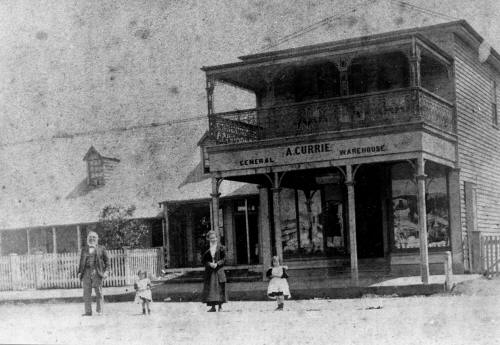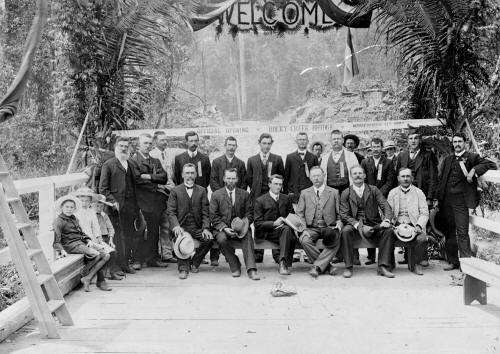|
Archibald Currie (1827-1916) and his brother Duncan
Currie (1831-1924) were born in Dunoon Scotland and emigrated to
Australia in the 1850's, where they left their mark forever on the
Richmond River district of NSW.
At the age of sixteen Archibald became apprenticed
on a sailing vessel trading to the East Indies. I believe Archibald
arrived as a crew member in Sydney, Australia on 26th July 1853,
aboard the "Earl of Elgin", a steamer carrying 372 Government
immigrants. Three weeks after the "Earl of Elgin" arrived, on 22nd
August, the Government Gazette posted an advertisement for Archibald
Currie, 5'4" with fair complexion, brown hair, grey eyes as having
deserted ship with a 5 pound reward. In September 1853
Archibald settled on the Richmond River on the north coast of NSW,
working as a cedar-getter (as a lot of other sailors who jumped ship
did). Life in the 'big scrub' as they called the area inland from
Ballina was hard and primitive and with no ministers or police
interference and little contact with civilisation, the cedar getters
lived to their own rules. The work involved felling enormous trees,
often 80 feet in height or more, using springboards. In December 1854
Archibald returned to Sydney and joined a schooner trading between
Sydney and the Richmond River as chief officer. He married Susan
Hutcheson (originally from Dundee 1835 - 1897) at Scots Presbyterian
Church in Sydney in 1855 and settled in Lismore NSW in that year.

Archibald in front of his shop
Five years later he was joined by his brother
Duncan who initally was engaged in cedar getting and later took up
farming. Duncan named his farm "Dunoon" after his birth place in
Scotland and the name was adopted as the name of the parish and is
still retained as the name of the adjacent village. Dunoon today is
known as the 'macadamia capital of Australia' and Duncan Currie is
considered its founding father. Duncan made himself a
prominent citizen in the region, winning prizes for his fruit at the
local agricultural shows, he also built and owned The Junction Hotel,
a 22 room affair in North Lismore which had parlours, dining rooms,
brick fireplaces, gas and plumbing. He built Dunoon house but rented
it out, preferring to live in a slab and shingle humpy overlooking his
orchard. He called macadamias 'bush nuts' and considered flying foxes
'a delicacy'. I have read that it was Duncan who first saw the
opportunity for growing bananas in the area and also (unsuccessfully)
petitioned the C.S.R to build a rail line to Dunoon to ship the sugar
cane. Duncan had the foresight to speak against the opening of the
land at Rocky Creek dam for settlement, arguing that it would be
needed for water (the Rocky Creek Dam now supplies the whole area with
water). A keen walker, Duncan would cross the Nightcap Range to the
Tweed in a day. He was well liked and respected and was always
invited to attend local events as a guest of honor or patron. Duncan
never married and lived to the age of 94. He prized two books he had
brought with him from Scotland, a bible and a volume of the poems of
Robbie Burns.
Archibald and his brother
Duncan established a small store, firstly near what is now called
Currie Park in North Lismore. 21 years later Archibald had a more
'pretentious' store in Bridge Street, North Lismore. He conducted
business on a system of exchange. Archibald dealt in timber
trade, shipping up to 200,000 feet a month. His store also carried a
large and comprehensive stock of general merchandise. Archibald and
Duncan were amongst the first to select land in the surrounding region
in the 1860's (old parish maps still show their names) and
Archibald owned several town lots in Lismore. Archibald was one of
the first aldermen elected for the borough and a member of the first
Lismore council of which he was one of only 6 members. He served as
Alderman from 1879-1882 and from 1885-1888 and was involved in the
Lismore Agricultural and Industrial Society and on the Lismore
Hospital Committee from 1881 - 1914 including two years as president.
A Justice of the Peace for the State, Archibald was also an active
member of the Presbyterian Church in Lismore and for many years an
elder. He was made a Mason in 1879 and occupied the highest official
positions in both this lodge and the Sons of Temperance. Archibald
Currie was, in short, a consistent champion for the advancement of the
town of Lismore and the surrounding district and for the well-being of
its people.

Opening of the Rocky Ck Bridge, with Duncan Currie
with his white beard on the far left
Archibald had 9 children, 8 of who survived infancy. A daughter
Elizabeth died of typhoid at the age of 25. Only three of Archibalds
children had children of their own, Susan, Margaret (my great
grandmother) and Mary Isabella. As neither of his Archibalds sons had
children the Currie name ended with this generation.
Both of these brothers were true pioneers who put their backs and
their hearts into their adopted land with energy and vision. It was
noted that they remained close friends right up until Archibalds
death.
|

